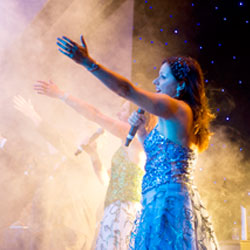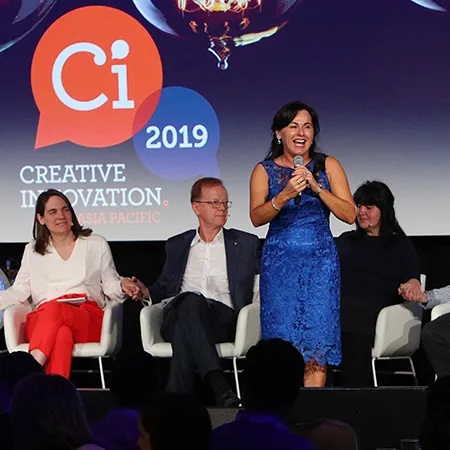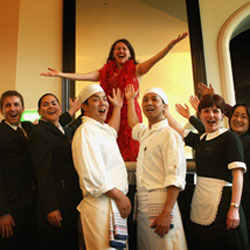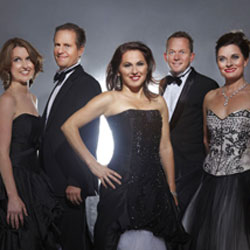I want to start with a snapshot of how I’m probably different from you and a lot of other people.
I don’t smoke. I haven’t been drunk, ever, nor do I really drink alcohol. Before this chapter of my life began, I’d never taken any drugs apart from those prescribed to me by a doctor. I live in Melbourne and I don’t even drink coffee.
Yet today, my life revolves around psychedelics — heavily stigmatized substances still illegal in this country and most others across the world.
I get it. This huge shift is likely confusing to you and it’s one I’d like to outline here in the hope it provides a deeper understanding of why I co-founded Mind Medicine Australia (MMA).
Helping People Find Their Voice
Not only does my personal life seem completely at odds with what I do now, but my entire career up until starting MMA was just as different from my current situation.
Over the past two decades, I’ve founded seven companies and three charities. I’m a Member of the Order of Australia, a sought after speaker, and a world-class soprano, performing both as a soloist and as part of a group that’s released 10 albums.
Singing is a massive part of my life. In creating the charity Creativity Australia and social inclusion program, With One Voice, my hope was to bring people from different backgrounds, generations, faiths and cultures, haves and have-nots together through the experience of singing in choirs. My ultimate mission in life is to help people find their voice and full creative potential — both literally and figuratively. I’ve witnessed how song can be a powerful tool in achieving this end.
I also believe psychedelics have a monumental role in helping me do this. In fact, I know they will allow me to scale this mission in a way I’d never dreamed possible. But I’ll get back to that.
First, I think it’s important to tell you about my own firsthand experiences using psychedelics.
The Journey From Sober Choir Starter to Psilocybin Seeker
Taking an illegal substance had never occurred to me until stumbling across Michael Pollan’s article in The New Yorker magazine titled ‘The Trip Treatment’ via a blog I received from Tim Ferriss. Reading it not only made me aware for the first time of the current resurgence in psychedelic research, but also helped me to understand how these ancient plant medicines were assisting people to heal from depression and trauma and come to terms with end-of-life anxiety. Something about this resonated so strongly with me.
From that point on, my interest in trying these hallucinogenic plants for myself began to grow. Remember, I had no idea what it was like to be drunk. I’d never once understood how it felt to be out of control. A vast majority of people expose themselves to these altered states on a regular basis. These behaviors are so prevalent, was I missing out on perhaps an essential experience of what it means to be human and a chance to further explore my psyche? What could psychedelics teach me about who I am or who I could be? What unknown parts of myself and our cosmos could they grant me access to?
So I recruited the support of Peter, my partner at the time and now husband, and we set out on a quest to have a therapeutic experience with psilocybin mushrooms. Having lost his father to suicide in his early teens, Peter was also interested in dealing with past traumas in a way he’d never thought available to him.
However, being able to do this in a safe and legal setting proved difficult. This was important to us. After first trying, and failing, to get into multiple trials happening globally at the time, we were eventually referred to a private therapist in the Netherlands, where the use of psychoactive truffles is legal. Our search over, we flew overseas, met him, and ingested a large dose of psilohuasca — a combination of psilocin-containing fungi and Syrian Rue, a MAO inhibitor used to enhance and prolong the effects of a trip.
Inner Journeying
I need to warn you: describing what it’s like when you take one of these substances is difficult… My first time was so far removed from anything I’d encountered before. Unless you’ve had your own experience with a psychedelic, let me tell you… you have no reference point of understanding what it’s like.
What I can tell you is from that point on, my life veered off in a direction I could never have imagined.
Heading into this, I was incredibly nervous. Having never lost control before, combined with everything I’d heard about psychedelics and drug use in general, I thought, without a doubt, that it was going to obliterate my brain.
That turned out to be as far as possible from reality. What happened was one of the most meaningful experiences of both our lives. It completely shot us into space. What initially overwhelmed me was this incredible sense that everything is in me and I’m in everything…See? I told you. This is difficult to describe.
It was as if all boundaries dissolved and there was just the magnificence of the planet, the plants, the animals, a sense of oneness, connection and love that was indescribable… I’ve never been able to kill a cockroach or even step on an ant since then, let alone eat meat!
These realizations were profound for me, but it’s the deeper insights Peter and I gained about ourselves that have left a lasting impression. What we learned from this one session was so profound and powerful, we didn’t feel compelled to have another for a whole year. Far more important than the psychedelic encounter itself is the integration of the experience. That takes time.
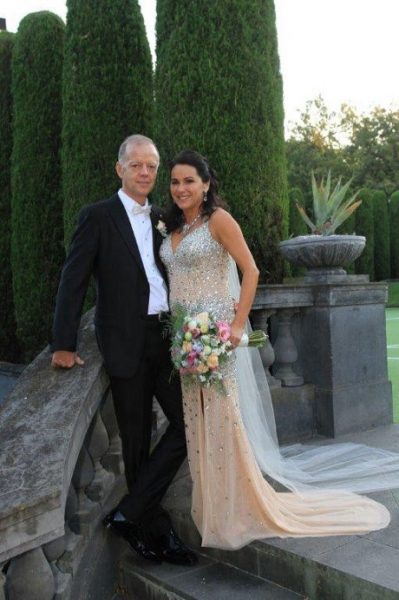
With my husband, Peter, on our wedding day, shortly after our first psilohuasca trip together.
The self-development Peter and I dove into following that first overseas expedition was vital for us. It’s an essential part of the process and a key component of our vision to make these substances available for widespread therapeutic use. While the psychedelic experience has been shown to significantly decrease activity in the brain’s default mode network and introduce entropy during the trip itself, it’s the work that’s achieved in subsequent integration that leads to lasting wisdom. The incredible neurogenesis and increased neural plasticity created by the medicines is truly remarkable. It’s a stage I think of as “joining the dots”. I do feel as if I understand a whole lot more than before.
This work continues to touch multiple areas of my life. For example, being born Jewish and having lost many of my relatives in the Holocaust, I’ve lived with transgenerational trauma for as long as I can remember. Whether I wanted to or not, I’ve confronted a lot of this during my medicine trips and undergone significant healing as a result.
My creativity has also increased massively. I’m able to access more moments of flow and purity in my singing, public speaking, curation of immersive events and writing. I’ve always been a really energetic person, but I’ve also noticed real lifts in my energy and consciousness. I feel more intelligent. Overall, I feel many neural pathways have reconnected for me and a whole lot of new ones have been formed. It’s like all these missing parts of myself have been found.
Creating a Movement, Making a Real Difference
Fast forward a few years later and Peter and I now seek out a session every six months. We call it our reset button. Every single time we work with these medicines, the experience is different. We get new insights and we heal a little more.
Not only have we woven psychedelic use into our lives, but the immense value we’ve gained from these magical medicines is what inspired Peter and I to establish our fifth charity, Mind Medicine Australia. If this medicine has affected us this much, imagine if it could heal hundreds of millions of people suffering with mental illnesses. And whilst our other charities are helping thousands of people through women’s shelters, social inclusion and educational programs, poverty alleviation and microfinance, we realised that at the heart of any kind of social isolation or disadvantage lies mental illness.
Mental illness keeps a person separate and alone. Rigid thought structures, feelings of despair and the belief that things aren’t going to work out for them… that feeling of not being loved and whole. These are the kinds of struggles people everywhere are dealing with. I know, because every day we get emails and letters and calls from those who’ve tried every other type of medication and therapy and are at the end of the road. It breaks my heart how much suffering and loneliness there is.
So we need to treat the underlying cause if people are to lead truly meaningful lives. And, in Australia alone, there are well over five or six million people suffering from mental illness.
But up until recently, Australia has been way behind in its psychedelic research and advocacy efforts. While there are wonderful volunteer-based groups out there pushing for change, there weren’t any professional organisations solely focused on making these medicines available in a therapeutic setting. We’re not saying that recreational use is bad. Not at all. But our aim is to help make these medicines accessible and affordable to people suffering from a mental illness in medically controlled environments. We believe that would be the most incredible gift we could offer to humanity.
And what have we achieved so far with MMA?
Having recently celebrated our first anniversary in February 2020, our charity has already taken huge steps towards achieving our mission of alleviating mental illness in Australia with research-backed, psychedelic-assisted psychotherapy which will significantly increase the treatments available to medical practitioners and their patients. We’ve attracted support from major players in the psychedelic space, including pioneers Roland Griffiths from Johns Hopkins University, Professor David Nutt, Head of Neuropsychopharmacology and Robin Carhart-Harris from Imperial College London, Rick Doblin from MAPS and many others. And, as well as planning a two-day international summit for this November — the first of its kind in the Asia-Pacific region — MMA is also part-funding the nation’s first psychedelic clinical trial. Currently underway at Melbourne’s St Vincent’s Hospital, the study is looking at the potential of psilocybin to treat end-of-life depression and anxiety.
Other key aspects of our strategy involve educational events and awareness building, the development and operation of an accredited practitioner training course, funding for relevant and novel clinical trials, the development of an appropriate legal and ethical structure for discussion with regulators, the development of reliable sources of pharmaceutical grade psilocybin and MDMA in Australia, the development of an Asia-Pacific Centre of Excellence based in Australia and maintenance and expansion of international information flows and rollout strategies so that all Australians who need these therapies can access them through the medical system.
But the work is far from over.
Where I would love to see this go is that we’re eventually able to help everyone, whatever their background, wherever they live, overcome the mental and physical conditions holding them back. In particular, I believe the potential to make a real dent in a range of difficult issues, like the environment, homelessness, domestic violence, eating disorders, dementia and substance abuse, is profound.
Scaling the Mission to Set People Free
We believe a lot of pain and suffering can be taken away if we can introduce genuine connection back into people’s lives.
If the current coronavirus crisis is teaching us anything, it’s that we are social animals and we are all connected. We’re born to touch and feel and hold other human beings and to be with them in a significant way. We’ve lost that sense of true human connection, which is the most beautiful thing of all… The power of a human being to love and be loved.
That’s why I set out, all those years ago, with a mission to unleash as many voices as possible through the healing power of music and song. And don’t get me wrong, I’m still very dedicated to doing this.
But today, with psychedelics and MMA, we’re taking that mission and scaling it in a way I could never have dreamed. With one of my great loves: Singing
The case for these medicines in a medically-controlled, therapeutic environment is extremely strong. Remission rates with these substances are between 60 and 80 percent after just a few sessions, versus around 20–30 percent for standard medicines or therapy over decades or a lifetime. With the results we’re seeing, why wouldn’t we make these medicines available? One of our board members, Dr. Simon Longstaff, who runs Australia’s Ethics Centre, believes it’s unethical to withhold them from people who are suffering.
What psychedelic medicines could provide is an extremely effective treatment option for medical professionals who are desperately seeking innovation and much-needed change in the way we treat mental illness. More than that, these medicines might help us rediscover the most important connection of all: the connection we have with ourselves. We can’t love others unless we love ourselves first.
At MMA, we’ll continue to do all we can to establish safe and effective psychedelic-assisted treatments, with the ultimate hope we can alleviate the unnecessary suffering that millions of Australians face every single day. We’d love it if you’d join us.
The following piece is also featured on Medium.com here.

